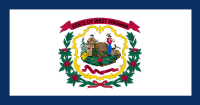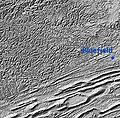Portal:West Virginia
The West Virginia PortalPanorama northwest, northeast and east from a ridge along West Virginia Route 42 between Elk Garden and Sulphur City in Mineral County, West Virginia (2016)
 West Virginia is a landlocked state in the Southern and Mid-Atlantic regions of the United States. It is bordered by Pennsylvania and Maryland to the northeast, Virginia to the southeast, Kentucky to the southwest, and Ohio to the northwest. West Virginia is the 10th-smallest state by area and ranks as the 12th-least populous state, with a population of 1,769,979 residents. The capital and most populous city is Charleston with a population of 49,055. West Virginia was admitted to the Union on June 20, 1863, and was a key border state during the American Civil War. It was the only state to form by separating from a Confederate state, one of two states (along with Nevada) admitted to the Union during the Civil War, and the third state to separate from another state, after Kentucky and Maine separated from Virginia and Massachusetts in 1792 and 1820, respectively. Some of its residents held slaves, but most were yeoman farmers, and the delegates provided for the gradual abolition of slavery in the new state constitution. The state legislature abolished slavery in the state, and at the same time ratified the 13th Amendment abolishing slavery nationally on February 3, 1865. West Virginia's northern panhandle extends adjacent to Pennsylvania and Ohio to form a tristate area, with Wheeling, Weirton, and Morgantown just across the border from the Pittsburgh metropolitan area. Huntington in the southwest is close to Ohio and Kentucky, while Martinsburg and Harpers Ferry in the eastern panhandle region are considered part of the Washington metropolitan area, between Maryland and Virginia. West Virginia is often included in several U.S. geographical regions, including the Mid-Atlantic, the Upland South, and the Southeastern United States. It is the only state entirely within the area served by the Appalachian Regional Commission; the area is commonly defined as "Appalachia". (Full article...) Entries here consist of Good and Featured articles, which meet a core set of high editorial standards.
The Romney Literary Society (also known as the Literary Society of Romney) existed from January 30, 1819, to February 15, 1886, in Romney, West Virginia. Established as the Polemic Society of Romney, it became the first organization of its kind in the present-day state of West Virginia, and one of the first in the United States. The society was founded by nine prominent men of Romney with the objectives of advancing literature and science, purchasing and maintaining a library, and improving educational opportunities. The society debated an extensive range of scientific and social topics, often violating its own rules which banned religious and political subjects. Even though its membership was relatively small, its debates and activities were frequently discussed throughout the Potomac Highlands region, and the organization greatly influenced trends of thought in the Romney community and surrounding areas. (Full article...) Selected article -William Anderson "Devil Anse" or “Uncle Anse” Hatfield (/ˈæns/; September 9, 1839 – January 6, 1921) was the patriarch of the West Virginian Hatfield family who led the family during the Hatfield–McCoy feud. (Full article...) General images -The following are images from various West Virginia-related articles on Wikipedia.
Did you know -
TopicsLargest citiesCategoriesNew articlesThis list was generated from these rules. Questions and feedback are always welcome! The search is being run daily with the most recent ~14 days of results. Note: Some articles may not be relevant to this project.
Rules | Match log | Results page (for watching) | Last updated: 2025-01-21 22:53 (UTC) Note: The list display can now be customized by each user. See List display personalization for details.
Related portalsWikiProjectsAssociated WikimediaThe following Wikimedia Foundation sister projects provide more on this subject:
Sources
|



















































